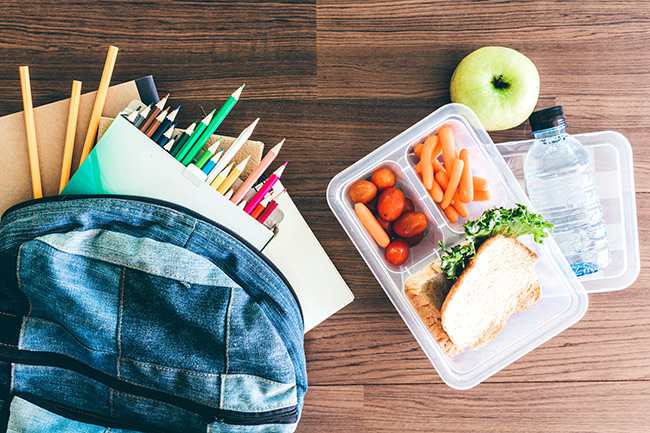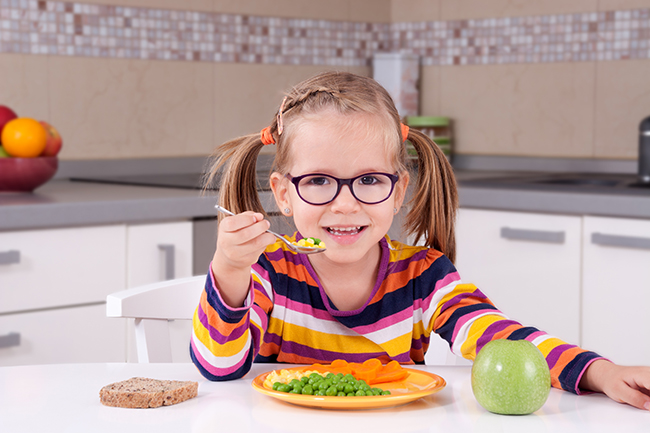

Kids’ breakfast, lunch and dinner ideas for back to school

A top child psychologist shares his 5 tips on creating healthy schoolday meals and how to encourage children to eat their vegetables
The nation’s children are finally returning to school after months at home due to the coronavirus pandemic, so that means establishing a good weekday routine once more.
The summer of treat foods and late bedtimes is over and now parents are focussing on keeping their children as healthy as possible – sustaining those energy levels for long school days and maintaining strong immune systems to ward off winter germs.
HELLO! caught up with child psychologist Dr Sam Wass from the TV series The Secret Life of 4 and 5-Year-Olds to discuss back to school meals…
WATCH: How to make quiche lorraine
What are your tips for creating healthy packed lunches?
Dr Sam Wass says: “To keep children fuller for longer it can be helpful to base the lunchbox on foods like bread, rice, pasta and potatoes. But if your child is the type who always leaves their veg on the side – then you’re going to have to be clever about it!
“Food such has Tilda Kids rice pouches can really help by including vegetables chopped up small – each serving counts as one of their five a day – but mixed in with something tasty, starchy and filling.”
MORE: This delicious marmalade chicken recipe will be an unexpected hit

Healthy packed lunch ideas from Dr Sam Wass
What are good energy-packed breakfasts for children to eat before school?
“You definitely want to be playing the ‘long game’ here – it’s hours between breakfast and lunch, and hunger pangs can really affect children’s concentration and learning in school.
“If you’ve got a child who’s reluctant to eat their fill at breakfast, then getting them involved in the food preparation can be a great way to help.
“Things like scrambled eggs, and porridge, are foods that even younger children can help to make for themselves. And giving them choice about the smaller details – like what topping that they have, or what plate or bowl they eat from – can be a great way of keeping them engaged and avoiding conflict.”

Dr Sam Wass
Can you recommend healthy snacks for children to eat after school?
“Getting the post-school snack right can make a big difference to your life – so this is something that’s definitely worth putting thought into beforehand.
“Don’t be tempted to go for the short-term fix – aim for something that keeps them full for long enough that they can concentrate on their homework, and so you’ve got time to get dinner ready in peace.
“That means something like malt loaf for example – which many kids love and which can be paired with a variety of different foods. Or pitta breads, oatcakes or rice cakes all lend themselves to DIY snacks, and are fun when experimenting with different toppings.”
MORE: 5 best healthy packed lunches for teenagers – a nutritionist’s guide
How can parents encourage children to eat more fruit and vegetables?
“One trick I love, when you’ve got a child who’s sitting staring at a pile of spinach on a plate, is to cut it up into two halves and say ‘OK it’s up to you, it’s your choice – which half do you want to eat?’ It’s amazing how often this works!
“Why is this? There’s a lot of psychology research suggesting that, as adults, we find it stressful to feel that we are out of control – and the same thing applies to children, too.
“So any way that you can help a child to feel that they are in control, the better. The more choice you can give them over the small details – whether they eat peas or cucumber, or which half of the spinach – the less stressful it will be for them – and for you!”

Mealtimes can be tricky with vegetables!
How can parents get their children to try new foods?
“Believe it or not, there are some good scientific reasons why certain foods tend to come out as favourites, year after year!
“For example, the densities of taste buds in children’s’ mouths are different, taste buds in children’s’ mouths are more concentrated meaning that they often prefer less strong-tasting foods. At the same time, though, we do have the capacity to encourage children to try new things – by learning positive associations for new foods.
“Children experience tastes differently – but taste is complicated! – and one thing that children often say is that they like eating grown-up foods, with the family, as it makes them feel more grown-up themselves.
“Sometimes, having a simplified version of adult foods can be a great way to do this. It encourages them to step beyond their ‘kiddy food’ comfort zone, but in a way that leaves them feeling in control, secure and confident.”
Dr Sam Wass is working with MumsNet accredited Tilda Kids Rice as part of a campaign to provide helpful tips and advice on introducing new flavours and textures into children’s diets.
Tilda Kids is perfect for children who are weaned and happily eating solid food and helps to make mealtimes guilt-free, quick and easy. For more information and recipe inspiration see